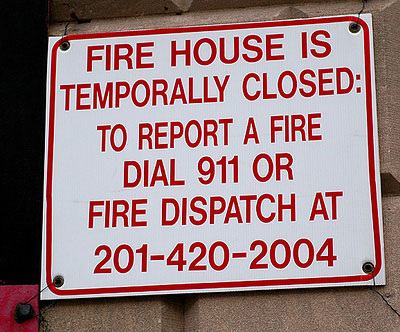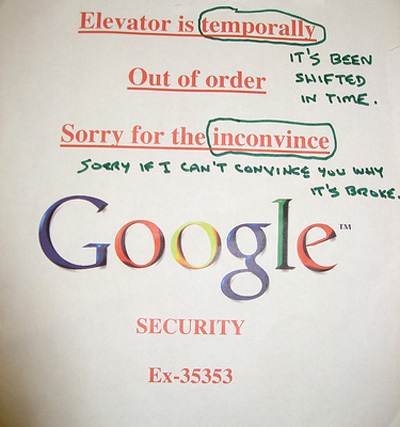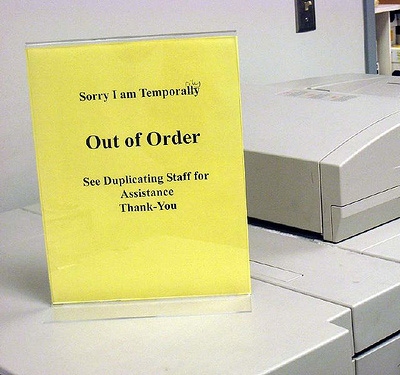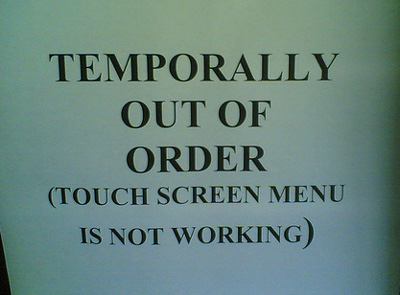Temporally speaking
« previous post | next post »
On BoingBoing, someone sent in this photo of an AT&T store in downtown Manhattan:
"Perhaps it'll be available last year," Mark Frauenfelder wryly notes. Commenters chime in with their own time-travel jokes, and a couple point out the added typo of "out stock" for "out of stock." One commenter wonders if the photo's a fake, but I'm quite sure it isn't. Substituting temporally for temporarily is a common error, perhaps due to the phonological process of haplology (the omission of one of a pair of similar sounding syllables, like saying lib'ry for library). [Or, as Andrea conjectures in the comments, it could be yet another result of the Cupertino effect.] It's so common that a quick search on Google Images and Flickr turned up a dozen more photos of signs with temporally. There are so many that it's probably just a matter of time before there's a whole blog dedicated to such signs, in the style of other peeveblogging we've seen (apostrophe abuse, unnecessary quotation marks, lowercase L, etc.). A gallery follows below.













Ellen said,
July 16, 2008 @ 12:44 pm
The fire house photographer (i.e. me) happens to be a loyal Language Log reader as well. That was a weird moment, seeing my photo turn up in my feed reader!
Rob said,
July 16, 2008 @ 12:49 pm
When I first looked at the sign, I didn't even notice the misspelling of 'Temporarily'. The first thing that came to mind was the rhetorical use of the adverb–that is, 'out of stock' is by definition a temporary state (stores are never 'permenently out of stock'; they discontinue an item or simply do not stock it any more). Thus, 'temporally [temporarily]' in this case is not necessary, but implies that the duration of the 'out of stock' state will be relatively shorter than is typical for sold out items. As with much advertising language, this is probably not true, but it's what iphone buys want to hear.
Ryan Rosso said,
July 16, 2008 @ 1:05 pm
I wonder, what are the implications of these mistakes? Are these speakers beginning to consciously use 'temporally' to mean 'temporarily,' or are these merely typos? If this trend continues, will we all one day be using 'temporally?'
John Laviolette said,
July 16, 2008 @ 1:28 pm
Here's a question, linked to the comment about people making time-travel jokes: how does the non-science-fictional uses of the adverb "temporally" compare to the science fictional ones? A quick Google shows some technical uses of "temporally", but in everyday language, does anyone ever use it except when talking about time-travel?
Bobbie said,
July 16, 2008 @ 1:32 pm
My favorite ones are the local stores that have changed their name and then say they were "formally" such and such [instead of formerly]. And worse, they didn't understand it when I called to complain!
Rob Gunningham said,
July 16, 2008 @ 1:35 pm
will we all one day be using 'temporally?
Probably has to do with the popularity of the pronunciation 'tempo-RARE-ily', as opposed to 'temporally'.
I expect this has been discussed many times, sorry Arnold, but it's a bit like the man on WNYC radio, Marty Wayne I think it was, who always said 'ambul-Ance' instead of a more normal 'ambulence'-type pronunciation in order presumably to emphasise the second 'a' in the spelling. Similarly on the tv hospital procedural 'House', where in practically every episode the doctors call for 'a lumb-Ar puncture' to be done on a patient, rather than the more usual (in UK English, anyway) 'lumb-Er' (do you linguists call that a schwa?) pronunciation.
Benjamin Zimmer said,
July 16, 2008 @ 1:40 pm
Bobbie: You mean like this?
(It's a confusion noted in the style guides — see Brians and Wilson.)
Jed Davis said,
July 16, 2008 @ 2:04 pm
There's also the religious sense of “temporal”, referring to matters of this world, as opposed to that which is eternal. So, maybe the elevator is broken for now, but it will work in the afterlife if one is found worthy. Or something.
rootlesscosmo said,
July 16, 2008 @ 2:33 pm
There's a neuroanatomy use of "temporal," but I can't imagine a situation in which anyone would use the adverbial form.
Irene said,
July 16, 2008 @ 2:48 pm
The German weekly "Der Spiegel" has a lot of this kind of stuff in it's monthly "Der Zwiebelfisch edition": http://www.spiegel.de/kultur/zwiebelfisch/
German speakers can subscribe to the newsletter.
Mateo Crawford said,
July 16, 2008 @ 3:21 pm
A quick Google shows some technical uses of "temporally", but in everyday language, does anyone ever use it except when talking about time-travel?
I use it on a regular basis in roughly the sense Jed Davis mentions, to refer to tangible things as explicitly contrasted with intangible ones (a slightly broader meaning than Jed refers to, I think). I don't recall encountering this usage in the wild and I don't know how I acquired it — I may have simply gotten it from the dictionary at some point in the misty past.
I am also a science fiction person, but the 'crosstalk' from the science fiction uses of temporal amuses rather than annoying or distracting me.
Shimon Edelman said,
July 16, 2008 @ 3:33 pm
The Hebrew sign in the original posting whose English part says "Temporally closed, exit from the entry gate" also commits an error in Hebrew: it uses the adjective form זמני instead of the corresponding adverb זמנית. This kind of substitution is a common phenomenon in everyday spoken Hebrew (people just don't seem to want to bother with the invariably longer adverb form), so no wonder there.
-Shimon
Timon said,
July 16, 2008 @ 4:01 pm
Could it also be that there are some Spanish speakers here who are taking the customary stab at Englishifying the word temporal? (Cf. faces with nice factions, invitations that occur after a meal out, etc.)
Tony said,
July 16, 2008 @ 4:02 pm
@Rob Gunningham,
I've never heard anyone in the U.S. pronounce lumbar in any fashion other than how you describe it being used on House.
Rob Gunningham said,
July 16, 2008 @ 4:39 pm
@ Tony,
That's interesting, and it just occurs to me that in the UK they don't use the word lumber to mean wood, so they don't need to make that distinction.
David Eddyshaw said,
July 16, 2008 @ 6:11 pm
Not only neuroanatomy:
In eye surgery the terms "nasal" and "temporal" are the standard ways to refer to the side of the eye toward the nose, and away from it, toward the temple, respectively.
This avoids the possible ghastly consequence of confusion between the surgeon's and the patient's right and left, all the more likely given that we're conditioned since medical school to mentally transpose and always refer to the patient's right and left, but in eye surgery you're sitting above the patient's head, so the sides are in fact the same …
The adverbial forms are also, naturally, in normal everyday use:
"Being right-handed, in cataract surgery on the right eye, I start my incision nasally and extend it temporally."
(Or at least I used to, before we all changed to very small incisions which you don't extend at all.)
dr pepper said,
July 16, 2008 @ 7:38 pm
But in Britain they do use "lumber" to mean "burden".
Andrea said,
July 16, 2008 @ 11:36 pm
I simply assumed these were cupertinos arising from the various sign makers' inability to spell 'temporarily.' (To test, I randomly misspelled 'temporarily,' and Firefox's first suggestion was, indeed, 'temporally.') Having a professional shop print your sign will in no way guarantee a correction.
David Marjanović said,
July 17, 2008 @ 7:52 am
It's almost invariably longer in English, too. But if Yiddish is anything like German, the adverb is just the undeclined form of the adjective, means, the one without an ending…
Strange. Why don't they say "medial(ly)" and "lateral(ly)" like everyone else?
Rob Gunningham said,
July 17, 2008 @ 8:03 am
@David Eddyshaw,
I like lasar eye surgery. Being awake I feel I've got more control over left and right mistakes, I don't have to write things over my eyebrows. I try to avoid the shaky-handed surgeon, though
Rob Gunningham said,
July 17, 2008 @ 8:10 am
Dr Pepper said, But in Britain they do use "lumber" to mean burden.
Myself, I don't make this kind of distinction in pronunciation, you might call them spelling distinctions, although the 'ambul-Ance' one has certainly meant that I don't spell that wrongly when I might otherwise have.
AJD said,
July 17, 2008 @ 9:18 am
Shimon Eldelman:
Does the Hebrew word זמני also mean 'temporal' or only 'temporary'? If זמני has the meaning 'temporal', this could be merely a case of picking the wrong English word to translate the Hebrew.
Shimon Edelman said,
July 17, 2008 @ 4:12 pm
In response to AJD: in Hebrew, זמני means only "temporary"; the standard means of generating a relatively rarely used adjective such as "temporal" is סמיכות — a kind of noun compounding in which, for example, the literal equivalent of "field of time" or שדה הזמן comes to mean "temporal field".
And speaking of frequency effects and entrenchment, my last name is all too often changed by English speakers into "Elderman", presumably because the Germanic prefix "Edel-" is rarer in English than the 5-gram "Elder" — see AJD's posting above for an example of this phenomenon :-)
-Shimon
a said,
July 17, 2008 @ 5:07 pm
I'm not sure the "out stock" is actually an error for "out of stock" at all– some folks who work in retail use "out-stock" as a noun (eg, "The day before the delivery comes, we've always got so many out-stocks, there's nothing left on the shelves!") I'm curious if this is an extension of that usage.
Brittlynn said,
July 17, 2008 @ 10:27 pm
Even funnier is that the smartass who corrected the Google sign wrote "Sorry I can't convince you why it's broke" instead of "broken."
Ah, to suffer from such wit.
Also, please point out the likely errors in this smart-assery II critique of smart-assery I.
David Eddyshaw said,
July 18, 2008 @ 7:04 am
David Marjanovic:
Dunno.
I expect we say nasal/temporal rather than medial/lateral just because we're better, OK?
Actually, if you turn the question round, and ask why lesser surgeons don't use our terms, it's clear that "nasal" and "temporal" aren't going to be useful terms if the part you're talking about isn't next to the nose or the temples.
There is, thinking about it, a shibboleth aspect to it: I've patiently corrected many a new trainee's "medial" and "lateral" to "nasal" and "temporal", so that (I suppose) they learn the right in-group-speak.
Rob Gunningham:
We do the vast majority of cataract operations under local anaesthetic – and that fact doubtless has indeed prevented many a right/left mistake.
You'd be amazed how many conscious patients would assume you knew what you were doing and just let you carry on, though … perhaps less so in the US than here in the UK.
David Eddyshaw said,
July 18, 2008 @ 7:25 am
To get more language-y:
I vaguely recall seeing a statement to the effect that the double meaning of "temporal" as "of time" and "of the temples" is not accidental.
Latin "tempus" is of course "time", but also "temple" (in the side-of-head sense).
The suggestion was that the temple is so so called because it's where the hair goes grey first.
I must say this has a folk-etymology lucus-a-non-lucendo look to me.
Anybody know?
Is there any parallel in other languages?
MaS said,
July 31, 2008 @ 1:25 am
[hosted by http://www.picamatic.com]
MaS said,
July 31, 2008 @ 1:27 am
I'm sorry, it seems html tags don't work properly.
Here's another spelling:
http://www.picamatic.com/show/2008/07/31/07/722634_623x404.jpg
I know the last comment was in 2008 said,
July 2, 2010 @ 9:59 am
A quick Google shows some technical uses of "temporally", but in everyday language, does anyone ever use it except when talking about time-travel?
"The person you've called is temporarily not available…"